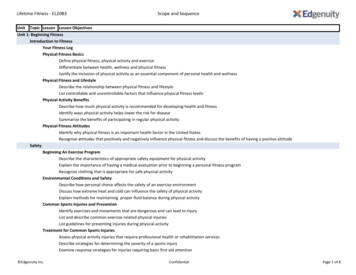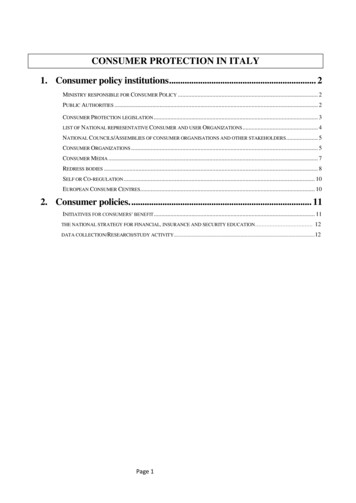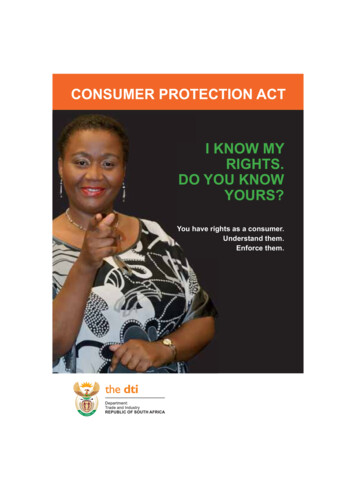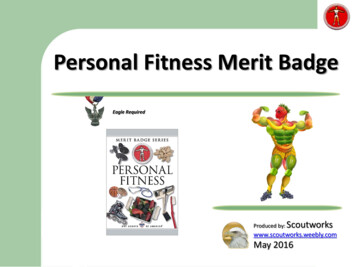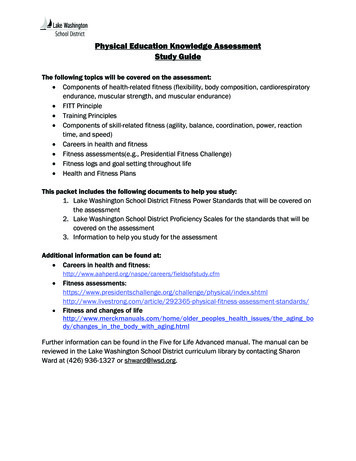
Transcription
20 Steps toFinancial Health:Achieving Lifelong Financial FitnessAmerican Consumer Credit Counseling130 Rumford AvenueAuburndale, MA 024661.800.769.3571ConsumerCredit.com
On behalf of American Consumer Credit Counseling we areproud to present 20 Steps to Financial Health: AchievingLifelong Financial Fitness. This booklet is designed toprovide an overview of the essential steps to achieving lifelongfinancial health – from getting financially organized and trackingyour spending, to understanding credit and protecting yourselffrom identity theft.We understand the devastating toll soaring debt and financialinstability can take on Americans and their families. I foundedour nonprofit organization in 1991 with the mission ofempowering consumers to achieve financial health througheducation, counseling and debt management. Since that time,ACCC has helped tens of thousands of Americans achievea wide range of financial goals – from understanding creditand overcoming debt to developing financial strategies andpurchasing their first home. Each year we provide hundredsof free community workshops and more than 36,000 budgetcounseling sessions.Our team has developed several publications and resourcesto help consumers improve their finances. We’ve createdthis booklet in the hope that it will be a valuable resourceto help you achieve lifelong financial health. For moreinformation and additional resources or assistance, please visitConsumerCredit.com.Sincerely,Steve TrumblePresident and CEOAmerican Consumer Credit Counseling1
Welcome to 20 Steps to Financial Health:Achieving Lifelong Financial Fitness. We hopethis resource helps you take the necessary steps towardsfinancial health and stability.1. Pledge to change how you feel about money.The first and most important step in developing and followinga financial plan is to examine your attitudes about money.Are you ready to accept responsibility for changing yourfinancial situation? Do you believe that you can and willchange the way you make financial decisions? Can you identifyat least one benefit you hope to gain by changing your moneymanagement behavior?You are definitely ready and able to start your path to financialwellness; if you are also willing, take the pledge!2
2. Get OrganizedAfter you make your pledge, it’s time to get financiallyorganized. Once organized, you will see your whole financialpicture. Proper planning and discipline will help you makechoices that will lead to sound financial management of yourfinances.Start with your financial record keeping such as your incomeand expenses. All papers associated with your income andexpenses should be kept in a safe place.Next consider organizing your legal documents. This mayinclude wills, health care proxy and power of attorney.Once you have your finances organized you can feel goodabout moving forward and taking your next steps to financialhealth. To help get you started, download a free copy ofACCC’s Personal Financial Workbook dgeting.aspx3. Get copies of your credit reportYour credit reports can provide a valuable snapshot of youroverall financial situation. Reviewing your credit reports foraccuracy can also help you to identify errors or fraudulentactivity. The Fair and Accurate Credit Transactions (FACT)Act gives every consumer the right to receive a free creditreport every year from each of the following credit bureaus:Experian, Transunion and Equifax. To check your report asoften as possible, you can stagger your requests and get onereport from one agency every 4 months. That way you’ll seeyour report three times within a year.To get your free credit report visitwww.AnnualCreditReport.com or you may call directly at877-322-8228.3
4. Dispute any erroneous information on yourcredit reportIf you find an erroron your credit reports,you are protectedunder the Fair CreditReporting Act (FCRA)and the credit bureausare required to providecorrect and completeinformationtocompanies requestingcredit histories. If youfind an error on your report, simply follow these steps: Write to the credit reporting agency disputing the itemand include any supporting documents. Keep a copy of alldocuments for your files. See a sample dispute letter edit.aspx When the credit reporting agency receives your letterdisputing the item, they must investigate the item in dispute(usually within 30 days) by presenting the information yousubmit to the creditor. By law, the creditor must review your evidence and reportits findings to the credit bureau. The credit bureau must then give you a written report of itsinvestigation and a copy of your report if the report resultsin a change.You can also fill out an online dispute form provided by thecredit bureaus. If an item on your report is found to be an errorand is corrected, you can request that the credit bureau sendcorrected copies of your report to any creditor who receivedyour report in the previous six months or any employer whoreceived your report in the previous two years.4
5.Set financial goalsSetting financial goals is an important step to financial health.Before you set your goals, follow the SMART rules.Goals should be Specific, Measurable, Achievable, Realisticand Timely.S Specific; I will pay off 5k in unsecured debtM Measurable; I will allow 100 per month for thatpaymentA Achievable; I can achieve this if I cut back on myexpenses, my cable TV and my cell phone billR Realistic; Instead of buying books or renting movies Iwill use my local library and attend free eventsT Timely; I will have my credit card debt paid off in 30months6. Set short mid and long term goalsWhen establishing your SMART goals, you may want to breakthem down further into short-term, mid-term and long-termgoals.Goals will differ in the length of time needed to achieve them.Short-term goals are priorities that can be accomplishedwithin one year. Mid-term goals are priorities that can beaccomplished within two to five years. Long term financialgoals are priorities that may take more than five years toaccomplish.Notes:5
7. Track your spendingWhile most individuals find tracking how and where their moneyis being spent tedious, it’s critically important to achievingfinancial health.You should track your spending for a minimum of 30 daysbefore developing a budget. If you don’t it can be difficultto really determine what your monthly expenses are. Werecommend that you track your spending until you feelcompletely comfortable with knowing where you money isbeing spent.There are many ways to track your spending. You can use anotebook and jot down every time you spend money. Anotheroption is to keep all receipts, and then later sort and track themin an excel file or in a daily calendar. Either way, the first thingyou need to determine is where your hard earned money isgoing.8. Create a budgetA budget is the most powerful tool you have for managingyour money and achieving financial health. A well-constructedbudget is something that everyone could and should have.A budget shows you the flow of money in (income) and out(expenses) of your household. A budget will also enable youto see how you are managing your money over a specific periodof time. Perhaps most importantly, it details how much moneyyou have, how much money you need to live and how you spendyour money. You should plan on developing a budget andrevise, revise and revise as your financial life changes. ACCCprovides several resources to help you create and manage yourbudget dgeting.aspx6
9. Reduce spendingReducing your daily, weekly and monthly spending is crucialin achieving financial health and an instrumental step tosuccessful budgeting. You would be amazed at how muchyou can reduce your spending just by tracking what you arespending your money on.Once you have determine what you are spending your moneyon, decide on where you can cut back to help support yournew financial plans. There is an abundance of ways to reducespending and here are just a few: Bring lunch to workPlan your grocery shopping and meals around salesLook for coupons that make sense to your family. Don’tbuy something you don’t use or eatCut back on cable and cell phone plansLook for free weekend entertainmentComparison shop for gasTake advantage of company benefits such as morningcoffee (if available) instead of store-bought coffeeConsider refinancing your mortgage and life insuranceKeep up with scheduled auto maintenence to preventcostly issues laterConsider public transportation or carpoolingShop for clothes out of season to find the best dealsFind more money-saving tips in ACCC’s How to Build Savingsby Cutting Back. Find it dgeting.aspx7
10. Determine your net worthDetermining net worth can help you measure your progressover time. The more you can save, the greater your networth will be. Networth is determinedby subtracting yourliabilities from yourassets. Liabilitiesinclude majorexpenses and debt.Periodicallyevaluating your networth can also help you in making financial decisions.11. Pay down debtThere are two schools of thinking when it comes to tacklingdebt. One method is to concentrate on paying off the debtwith the smallest balance first (never forget to make requiredpayments to all debts, of course). After that balance isrepaid, you can then apply that payment to the card with thenext smallest balance and continue the process until all debtsare satisfied. This method can be very rewarding becauseyou see progress quickly.The other popular method is to first concentrate onrepaying the debt with the highest interest rate. Thismethod will save you the most in interest charges overtime. Regardless of the method you choose, be patient andpersistent. You can calculate your monthly payoff amountand date of completion using ACCC’s debt payoff r.aspx8
12. Eliminate unnecessary credit cardsThe truth is there is no “correct” amount of credit cards to ownand use. When determining the impact on credit there is noone size fits all type of answer. The credit scoring model looksat the number of creditcards you have, but alwaysin comparison with otherinformation on your creditreport. The best number ofcredit cards depends on yourability to manage your debtand credit card payments.You can tell if you have toomuch credit by looking at and analyzing the following:a. Debt to income ratiob. Do you have difficulty managing credit cards?c. Is your credit utilization too high?d. Do you have too many cards?e. Is your mix of credit healthy?For help finding answers to these questions, use ACCC’s PersonalFinancial Workbook found dgeting.aspx13. Start a savings plan9Reaching your financial goals requires a strong commitment tosaving. That is one reason saving is an essential part of achievingfinancial health. You should plan on committing to a 10 percentsavings plan.If you are having trouble establishing a nest-egg, don’t despair.The following are some simple ways to boost your savings: Direct deposit – most employers offer this convenience Cutting back where ever possible Having a garage sale to get rid of unwanted items Even consider a part time job
14. Protecting your assetsOne of the best ways to care for your family and achievefinancial health is to be sure that you are prepared. Thefollowing are four critical policies to review and consider tohelp ensure protection for your family if something were tohappen to you or another member of your family: Review your health insurance policy and ensure there isadequate coverage Auto policy Life insurance Disability insurance15. Managing major purchasesDo you have a major purchase coming up like a new car, ahome or possibly even a new television? No matter what youare thinking of purchasing, planning, preparing and managinga major purchase is part of achieving financial health. Priorto making a major purchase review the following:a. Financial goals – Make sure you have included your majorpurchase in your goals and plans to pay for your majorpurchaseb. Budget – can your budget support this purchase?c. Cash flow – Do you have any cash to put towards yourmajor purchase?d. Accessibility and availability of credit – Are you in astrong enough financial position where you will be grantedcredit with reasonable terms?Notes:10
16. Securing your financial futureYou work hard for your money and your money should workhard for you. Investing is one way to potentially grow yournet worth.Prior to investing you shouldthink about your toleranceof risk. We all want ourmoney to grow big and fast,but how much risk are youwilling to assume? Beforeyou invest, do your researchand comparison shopping.If you have access to a financial planner that you can trustthat is probably a good start. If not you should comparebefore signing on your future financial assets.And whenever possible take advantage of employer-sponsoredinvestment plans such as a 401k. These can help you prepareand secure your financial future.17. Financial checkupsAchieving financial health doesn’t happen overnight. It takestime and commitment and that is why a periodic check-in andmake sure you are on track is beneficial. It’s easy to let thingsfall by the wayside once you have established a routine, butthings change.Plan on reviewing what you have put in place every 3 months.You do not need to spend a great deal of time, but a quickreview can be quite helpful. If you experience a job promotionand your income has changed for the better, this is a greatopportunity to check in and update your financial plan.11
18. Understanding the cost of creditIt is important to carefully weigh your options before makinga credit decision. When you sign or co-sign an applicationfor credit, you are agreeing to all its terms. Moving forward,commit to understand everything that you are agreeing to. Atthe very least, compare the following terms before making aborrowing decision: Interest rate or APR - APR is the annual interest rate youwill be charged on a loan or the unpaid balance of a creditcard Length of the loan - as the length of the loan increases,the monthly payment will decrease, but the total interestcharge will increase Finance charge - the total cost of the loan stated in dollars Credit limit - the maximum amount you borrow at anytime Minimum monthly payment - the smallest payment yourcreditor will accept Grace period - number of days you have to pay your billin full before interest is charged Over the limit and late fees - the amount you will becharged if you are late with a payment or go over your creditlimitNotes:12
19. Protecting your identityIdentity theft happens when your personal identificationinformation such as your social security number, your nameor your credit card is stolen to commit fraud. Identity Theft isone of the Federal Trade Commission’s leading complaints.One of the easiest and most effective ways to determine ifyou have been a victim of identity theft is by pulling yourcredit report. This is the first place you will probably noticesigns of victimization. Pay attention to the following waysidentity theft happens:a. Dumpster Diving – Shred any papers with accountnumbers including personal checks, or any personalidentifying informationb. Skimming – Credit/debit card numbers are stolen bythe use of a special storage device when your credit cardpayment is being processedc. Phishing – If you get emails from financial institutionsasking you to reveal personal informationd. Changing your address – Never fill a change of addressform for a company/individual you do not recognize.e. Stealing – If your wallet is stolen is a sure fire way ofhaving your identity misusedf. Pre-texting – Emails claiming you are the heir to afortune, or one from a government agency saying you willget 200,000 in a pre-paid card aftering sending 100Always remember, if it sounds too good to be true, it is.13
20. Watch out for the warning signsSometimes we don’t see the signs of financial trouble until it istoo late. However, knowing how to recognize the warningsigns may help save you from having your debt spiral out ofcontrol. Some of these signs may include: Paying your bills after the payment due date Missing your credit card or loan payments altogether Relying on overtime to cover your debt related expenses Borrowing from family members to make your monthlydebt payments Skipping one credit card bill to pay another Transferring balances from one credit card to another Ignoring your credit card statements Not having set aside money in your monthly budget topay off your debtsAbout American Consumer Credit CounselingAmerican Consumer Credit Counseling (ACCC) is a non-profit501(c)(3) organization dedicated to empowering consumers toachieve financial health through education, counseling, and debtmanagement. ACCC provides individuals with practical solutionsfor solving financial problems and recognizes that consumers’financial difficulties are often not the result of poor spendinghabits, but more frequently from extenuating circumstancesbeyond their control.As one of the nation’s leading providers of financial educationand credit counseling services, ACCC works with consumersto help them with the best plan of action to reduce their debtand regain financial stability. ACCC is accredited by the BetterBusiness Bureau and holds an A rating. It is also a member ofthe Association of Independent Consumer Credit CounselingAgencies. For more information or to access free financialeducation resources log on to ConsumerCredit.com.14
You Can Achieve LifelongFinancial Health and StabilityThere is help. Since 1991, American ConsumerCredit Counseling has helped consumers regainfinancial stability with:Credit CounselingDebt ManagementPre-Bankruptcy CertificatesPost-Debtor Education CourseHousing CounselingStudent Loan CounselingFinancial ResourcesCommunity WorkshopsTalkingCentsBlog.com
American Consumer Credit Counseling 130 Rumford Avenue Auburndale, MA 02466 1.800.769.3571 ConsumerCredit.com 20 Steps to Financial Health: Achieving Lifelong Financial Fitness. 1 On behalf of American Consumer Credit Counseling we are proud to present 20 Steps to Financial Health: Achieving
